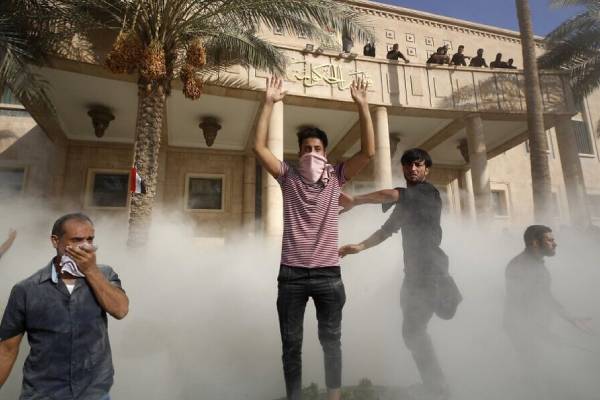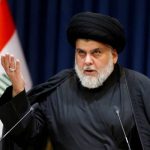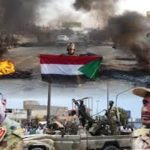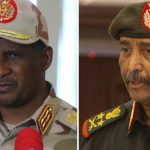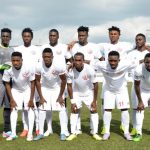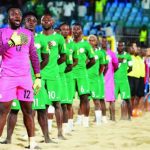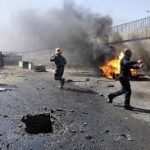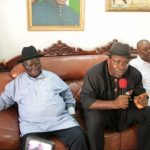Fighting has continued in the Iraqi capital between supporters of the Shia religious leader Muqtada al-Sadr and his Iran-backed opponents, as well as Iraqi security forces, killing at least 30 people.
Residents of Baghdad woke up to the sounds of intermittent gunfire and explosions on Tuesday from the fortified Green Zone, an area that houses government buildings and foreign embassies.
The Iraqi military said that militia fighters had fired several rockets at the Green Zone, with the streets empty after the military announced a curfew on Monday evening, after the violence began.
“We have been hearing sounds of gunfire overnight, medium and light weapons have been used, we heard also several explosions inside the Green Zone, the C-RAM air defence system that belongs to the US embassy in the Green Zone was clearly heard early this morning,” said Al Jazeera’s Mahmoud Abdelwahed, reporting from Baghdad.
“The situation is very tense and it seems that all efforts to deescalate have gone to no avail as of yet. There have been calls for the Grand Marji’a [the Shia religious leadership] in Najaf city to intervene to put an end to this conflict.”
Al-Sadr’s supporters had converged on the Republican Palace, which houses the headquarters of the Iraqi government, as well as a sit-in where supporters of the rival Coordination Framework Alliance are gathered, after the religious leader claimed that he was “withdrawing from politics” earlier on Monday.
Al-Sadr has previously declared several times that he was withdrawing from politics, only to later backtrack.
As night fell heavy fighting broke out in the worst fighting the Iraqi capital has seen in years.
By the morning Iraqi security forces said they had forced out al-Sadr’s supporters from the Republican Palace, while a source told Al Jazeera Arabic that negotiations are taking place between government officials, and leaders from the Sadrists and the Coordination Framework Alliance.
Al-Sadr himself has begun a hunger strike “until the violence and use of weapons” ends, according to the head of the Sadrist parliamentary bloc Hassan al-Athary.
The violence is the culmination of a political crisis that began after parliamentary elections in October, in which supporters of al-Sadr emerged as the biggest party, but were unable to form a government.
Al-Sadr withdrew his bloc from parliament in June, before his supporters stormed the parliament building in late July in an effort to stop lawmakers from choosing a new prime minister.
The religious leader has called for the dissolution of parliament – the Iraqi Supreme Federal Court had been scheduled to pass judgment on that call, but the meeting is now likely to be postponed, with all state institutions closed.
“This was expected, there have been warnings in the past few months,” said Abdelwahed. “Things have been escalating and we have been witnessing protests and counter-protests, sit-ins and counter sit-ins.”
The violence has also spread to other areas of southern and central Iraq, with reports of fighting in several cities, and al-Sadr supporters raiding the offices of their political rivals.
Fighting has continued in the Iraqi capital between supporters of the Shia religious leader Muqtada al-Sadr and his Iran-backed opponents, as well as Iraqi security forces, killing at least 30 people.
Residents of Baghdad woke up to the sounds of intermittent gunfire and explosions on Tuesday from the fortified Green Zone, an area that houses government buildings and foreign embassies.
The Iraqi military said that militia fighters had fired several rockets at the Green Zone, with the streets empty after the military announced a curfew on Monday evening, after the violence began.
“We have been hearing sounds of gunfire overnight, medium and light weapons have been used, we heard also several explosions inside the Green Zone, the C-RAM air defence system that belongs to the US embassy in the Green Zone was clearly heard early this morning,” said Al Jazeera’s Mahmoud Abdelwahed, reporting from Baghdad.
“The situation is very tense and it seems that all efforts to deescalate have gone to no avail as of yet. There have been calls for the Grand Marji’a [the Shia religious leadership] in Najaf city to intervene to put an end to this conflict.”
Al-Sadr’s supporters had converged on the Republican Palace, which houses the headquarters of the Iraqi government, as well as a sit-in where supporters of the rival Coordination Framework Alliance are gathered, after the religious leader claimed that he was “withdrawing from politics” earlier on Monday.
Al-Sadr has previously declared several times that he was withdrawing from politics, only to later backtrack.
As night fell heavy fighting broke out in the worst fighting the Iraqi capital has seen in years.
By the morning Iraqi security forces said they had forced out al-Sadr’s supporters from the Republican Palace, while a source told Al Jazeera Arabic that negotiations are taking place between government officials, and leaders from the Sadrists and the Coordination Framework Alliance.
Al-Sadr himself has begun a hunger strike “until the violence and use of weapons” ends, according to the head of the Sadrist parliamentary bloc Hassan al-Athary.
The violence is the culmination of a political crisis that began after parliamentary elections in October, in which supporters of al-Sadr emerged as the biggest party, but were unable to form a government.
Al-Sadr withdrew his bloc from parliament in June, before his supporters stormed the parliament building in late July in an effort to stop lawmakers from choosing a new prime minister.
The religious leader has called for the dissolution of parliament – the Iraqi Supreme Federal Court had been scheduled to pass judgment on that call, but the meeting is now likely to be postponed, with all state institutions closed.
“This was expected, there have been warnings in the past few months,” said Abdelwahed. “Things have been escalating and we have been witnessing protests and counter-protests, sit-ins and counter sit-ins.”
The violence has also spread to other areas of southern and central Iraq, with reports of fighting in several cities, and al-Sadr supporters raiding the offices of their political rivals.
Fighting has continued in the Iraqi capital between supporters of the Shia religious leader Muqtada al-Sadr and his Iran-backed opponents, as well as Iraqi security forces, killing at least 30 people.
Residents of Baghdad woke up to the sounds of intermittent gunfire and explosions on Tuesday from the fortified Green Zone, an area that houses government buildings and foreign embassies.
The Iraqi military said that militia fighters had fired several rockets at the Green Zone, with the streets empty after the military announced a curfew on Monday evening, after the violence began.
“We have been hearing sounds of gunfire overnight, medium and light weapons have been used, we heard also several explosions inside the Green Zone, the C-RAM air defence system that belongs to the US embassy in the Green Zone was clearly heard early this morning,” said Al Jazeera’s Mahmoud Abdelwahed, reporting from Baghdad.
“The situation is very tense and it seems that all efforts to deescalate have gone to no avail as of yet. There have been calls for the Grand Marji’a [the Shia religious leadership] in Najaf city to intervene to put an end to this conflict.”
Al-Sadr’s supporters had converged on the Republican Palace, which houses the headquarters of the Iraqi government, as well as a sit-in where supporters of the rival Coordination Framework Alliance are gathered, after the religious leader claimed that he was “withdrawing from politics” earlier on Monday.
Al-Sadr has previously declared several times that he was withdrawing from politics, only to later backtrack.
As night fell heavy fighting broke out in the worst fighting the Iraqi capital has seen in years.
By the morning Iraqi security forces said they had forced out al-Sadr’s supporters from the Republican Palace, while a source told Al Jazeera Arabic that negotiations are taking place between government officials, and leaders from the Sadrists and the Coordination Framework Alliance.
Al-Sadr himself has begun a hunger strike “until the violence and use of weapons” ends, according to the head of the Sadrist parliamentary bloc Hassan al-Athary.
The violence is the culmination of a political crisis that began after parliamentary elections in October, in which supporters of al-Sadr emerged as the biggest party, but were unable to form a government.
Al-Sadr withdrew his bloc from parliament in June, before his supporters stormed the parliament building in late July in an effort to stop lawmakers from choosing a new prime minister.
The religious leader has called for the dissolution of parliament – the Iraqi Supreme Federal Court had been scheduled to pass judgment on that call, but the meeting is now likely to be postponed, with all state institutions closed.
“This was expected, there have been warnings in the past few months,” said Abdelwahed. “Things have been escalating and we have been witnessing protests and counter-protests, sit-ins and counter sit-ins.”
The violence has also spread to other areas of southern and central Iraq, with reports of fighting in several cities, and al-Sadr supporters raiding the offices of their political rivals.
Fighting has continued in the Iraqi capital between supporters of the Shia religious leader Muqtada al-Sadr and his Iran-backed opponents, as well as Iraqi security forces, killing at least 30 people.
Residents of Baghdad woke up to the sounds of intermittent gunfire and explosions on Tuesday from the fortified Green Zone, an area that houses government buildings and foreign embassies.
The Iraqi military said that militia fighters had fired several rockets at the Green Zone, with the streets empty after the military announced a curfew on Monday evening, after the violence began.
“We have been hearing sounds of gunfire overnight, medium and light weapons have been used, we heard also several explosions inside the Green Zone, the C-RAM air defence system that belongs to the US embassy in the Green Zone was clearly heard early this morning,” said Al Jazeera’s Mahmoud Abdelwahed, reporting from Baghdad.
“The situation is very tense and it seems that all efforts to deescalate have gone to no avail as of yet. There have been calls for the Grand Marji’a [the Shia religious leadership] in Najaf city to intervene to put an end to this conflict.”
Al-Sadr’s supporters had converged on the Republican Palace, which houses the headquarters of the Iraqi government, as well as a sit-in where supporters of the rival Coordination Framework Alliance are gathered, after the religious leader claimed that he was “withdrawing from politics” earlier on Monday.
Al-Sadr has previously declared several times that he was withdrawing from politics, only to later backtrack.
As night fell heavy fighting broke out in the worst fighting the Iraqi capital has seen in years.
By the morning Iraqi security forces said they had forced out al-Sadr’s supporters from the Republican Palace, while a source told Al Jazeera Arabic that negotiations are taking place between government officials, and leaders from the Sadrists and the Coordination Framework Alliance.
Al-Sadr himself has begun a hunger strike “until the violence and use of weapons” ends, according to the head of the Sadrist parliamentary bloc Hassan al-Athary.
The violence is the culmination of a political crisis that began after parliamentary elections in October, in which supporters of al-Sadr emerged as the biggest party, but were unable to form a government.
Al-Sadr withdrew his bloc from parliament in June, before his supporters stormed the parliament building in late July in an effort to stop lawmakers from choosing a new prime minister.
The religious leader has called for the dissolution of parliament – the Iraqi Supreme Federal Court had been scheduled to pass judgment on that call, but the meeting is now likely to be postponed, with all state institutions closed.
“This was expected, there have been warnings in the past few months,” said Abdelwahed. “Things have been escalating and we have been witnessing protests and counter-protests, sit-ins and counter sit-ins.”
The violence has also spread to other areas of southern and central Iraq, with reports of fighting in several cities, and al-Sadr supporters raiding the offices of their political rivals.
Fighting has continued in the Iraqi capital between supporters of the Shia religious leader Muqtada al-Sadr and his Iran-backed opponents, as well as Iraqi security forces, killing at least 30 people.
Residents of Baghdad woke up to the sounds of intermittent gunfire and explosions on Tuesday from the fortified Green Zone, an area that houses government buildings and foreign embassies.
The Iraqi military said that militia fighters had fired several rockets at the Green Zone, with the streets empty after the military announced a curfew on Monday evening, after the violence began.
“We have been hearing sounds of gunfire overnight, medium and light weapons have been used, we heard also several explosions inside the Green Zone, the C-RAM air defence system that belongs to the US embassy in the Green Zone was clearly heard early this morning,” said Al Jazeera’s Mahmoud Abdelwahed, reporting from Baghdad.
“The situation is very tense and it seems that all efforts to deescalate have gone to no avail as of yet. There have been calls for the Grand Marji’a [the Shia religious leadership] in Najaf city to intervene to put an end to this conflict.”
Al-Sadr’s supporters had converged on the Republican Palace, which houses the headquarters of the Iraqi government, as well as a sit-in where supporters of the rival Coordination Framework Alliance are gathered, after the religious leader claimed that he was “withdrawing from politics” earlier on Monday.
Al-Sadr has previously declared several times that he was withdrawing from politics, only to later backtrack.
As night fell heavy fighting broke out in the worst fighting the Iraqi capital has seen in years.
By the morning Iraqi security forces said they had forced out al-Sadr’s supporters from the Republican Palace, while a source told Al Jazeera Arabic that negotiations are taking place between government officials, and leaders from the Sadrists and the Coordination Framework Alliance.
Al-Sadr himself has begun a hunger strike “until the violence and use of weapons” ends, according to the head of the Sadrist parliamentary bloc Hassan al-Athary.
The violence is the culmination of a political crisis that began after parliamentary elections in October, in which supporters of al-Sadr emerged as the biggest party, but were unable to form a government.
Al-Sadr withdrew his bloc from parliament in June, before his supporters stormed the parliament building in late July in an effort to stop lawmakers from choosing a new prime minister.
The religious leader has called for the dissolution of parliament – the Iraqi Supreme Federal Court had been scheduled to pass judgment on that call, but the meeting is now likely to be postponed, with all state institutions closed.
“This was expected, there have been warnings in the past few months,” said Abdelwahed. “Things have been escalating and we have been witnessing protests and counter-protests, sit-ins and counter sit-ins.”
The violence has also spread to other areas of southern and central Iraq, with reports of fighting in several cities, and al-Sadr supporters raiding the offices of their political rivals.
Fighting has continued in the Iraqi capital between supporters of the Shia religious leader Muqtada al-Sadr and his Iran-backed opponents, as well as Iraqi security forces, killing at least 30 people.
Residents of Baghdad woke up to the sounds of intermittent gunfire and explosions on Tuesday from the fortified Green Zone, an area that houses government buildings and foreign embassies.
The Iraqi military said that militia fighters had fired several rockets at the Green Zone, with the streets empty after the military announced a curfew on Monday evening, after the violence began.
“We have been hearing sounds of gunfire overnight, medium and light weapons have been used, we heard also several explosions inside the Green Zone, the C-RAM air defence system that belongs to the US embassy in the Green Zone was clearly heard early this morning,” said Al Jazeera’s Mahmoud Abdelwahed, reporting from Baghdad.
“The situation is very tense and it seems that all efforts to deescalate have gone to no avail as of yet. There have been calls for the Grand Marji’a [the Shia religious leadership] in Najaf city to intervene to put an end to this conflict.”
Al-Sadr’s supporters had converged on the Republican Palace, which houses the headquarters of the Iraqi government, as well as a sit-in where supporters of the rival Coordination Framework Alliance are gathered, after the religious leader claimed that he was “withdrawing from politics” earlier on Monday.
Al-Sadr has previously declared several times that he was withdrawing from politics, only to later backtrack.
As night fell heavy fighting broke out in the worst fighting the Iraqi capital has seen in years.
By the morning Iraqi security forces said they had forced out al-Sadr’s supporters from the Republican Palace, while a source told Al Jazeera Arabic that negotiations are taking place between government officials, and leaders from the Sadrists and the Coordination Framework Alliance.
Al-Sadr himself has begun a hunger strike “until the violence and use of weapons” ends, according to the head of the Sadrist parliamentary bloc Hassan al-Athary.
The violence is the culmination of a political crisis that began after parliamentary elections in October, in which supporters of al-Sadr emerged as the biggest party, but were unable to form a government.
Al-Sadr withdrew his bloc from parliament in June, before his supporters stormed the parliament building in late July in an effort to stop lawmakers from choosing a new prime minister.
The religious leader has called for the dissolution of parliament – the Iraqi Supreme Federal Court had been scheduled to pass judgment on that call, but the meeting is now likely to be postponed, with all state institutions closed.
“This was expected, there have been warnings in the past few months,” said Abdelwahed. “Things have been escalating and we have been witnessing protests and counter-protests, sit-ins and counter sit-ins.”
The violence has also spread to other areas of southern and central Iraq, with reports of fighting in several cities, and al-Sadr supporters raiding the offices of their political rivals.
Fighting has continued in the Iraqi capital between supporters of the Shia religious leader Muqtada al-Sadr and his Iran-backed opponents, as well as Iraqi security forces, killing at least 30 people.
Residents of Baghdad woke up to the sounds of intermittent gunfire and explosions on Tuesday from the fortified Green Zone, an area that houses government buildings and foreign embassies.
The Iraqi military said that militia fighters had fired several rockets at the Green Zone, with the streets empty after the military announced a curfew on Monday evening, after the violence began.
“We have been hearing sounds of gunfire overnight, medium and light weapons have been used, we heard also several explosions inside the Green Zone, the C-RAM air defence system that belongs to the US embassy in the Green Zone was clearly heard early this morning,” said Al Jazeera’s Mahmoud Abdelwahed, reporting from Baghdad.
“The situation is very tense and it seems that all efforts to deescalate have gone to no avail as of yet. There have been calls for the Grand Marji’a [the Shia religious leadership] in Najaf city to intervene to put an end to this conflict.”
Al-Sadr’s supporters had converged on the Republican Palace, which houses the headquarters of the Iraqi government, as well as a sit-in where supporters of the rival Coordination Framework Alliance are gathered, after the religious leader claimed that he was “withdrawing from politics” earlier on Monday.
Al-Sadr has previously declared several times that he was withdrawing from politics, only to later backtrack.
As night fell heavy fighting broke out in the worst fighting the Iraqi capital has seen in years.
By the morning Iraqi security forces said they had forced out al-Sadr’s supporters from the Republican Palace, while a source told Al Jazeera Arabic that negotiations are taking place between government officials, and leaders from the Sadrists and the Coordination Framework Alliance.
Al-Sadr himself has begun a hunger strike “until the violence and use of weapons” ends, according to the head of the Sadrist parliamentary bloc Hassan al-Athary.
The violence is the culmination of a political crisis that began after parliamentary elections in October, in which supporters of al-Sadr emerged as the biggest party, but were unable to form a government.
Al-Sadr withdrew his bloc from parliament in June, before his supporters stormed the parliament building in late July in an effort to stop lawmakers from choosing a new prime minister.
The religious leader has called for the dissolution of parliament – the Iraqi Supreme Federal Court had been scheduled to pass judgment on that call, but the meeting is now likely to be postponed, with all state institutions closed.
“This was expected, there have been warnings in the past few months,” said Abdelwahed. “Things have been escalating and we have been witnessing protests and counter-protests, sit-ins and counter sit-ins.”
The violence has also spread to other areas of southern and central Iraq, with reports of fighting in several cities, and al-Sadr supporters raiding the offices of their political rivals.
Fighting has continued in the Iraqi capital between supporters of the Shia religious leader Muqtada al-Sadr and his Iran-backed opponents, as well as Iraqi security forces, killing at least 30 people.
Residents of Baghdad woke up to the sounds of intermittent gunfire and explosions on Tuesday from the fortified Green Zone, an area that houses government buildings and foreign embassies.
The Iraqi military said that militia fighters had fired several rockets at the Green Zone, with the streets empty after the military announced a curfew on Monday evening, after the violence began.
“We have been hearing sounds of gunfire overnight, medium and light weapons have been used, we heard also several explosions inside the Green Zone, the C-RAM air defence system that belongs to the US embassy in the Green Zone was clearly heard early this morning,” said Al Jazeera’s Mahmoud Abdelwahed, reporting from Baghdad.
“The situation is very tense and it seems that all efforts to deescalate have gone to no avail as of yet. There have been calls for the Grand Marji’a [the Shia religious leadership] in Najaf city to intervene to put an end to this conflict.”
Al-Sadr’s supporters had converged on the Republican Palace, which houses the headquarters of the Iraqi government, as well as a sit-in where supporters of the rival Coordination Framework Alliance are gathered, after the religious leader claimed that he was “withdrawing from politics” earlier on Monday.
Al-Sadr has previously declared several times that he was withdrawing from politics, only to later backtrack.
As night fell heavy fighting broke out in the worst fighting the Iraqi capital has seen in years.
By the morning Iraqi security forces said they had forced out al-Sadr’s supporters from the Republican Palace, while a source told Al Jazeera Arabic that negotiations are taking place between government officials, and leaders from the Sadrists and the Coordination Framework Alliance.
Al-Sadr himself has begun a hunger strike “until the violence and use of weapons” ends, according to the head of the Sadrist parliamentary bloc Hassan al-Athary.
The violence is the culmination of a political crisis that began after parliamentary elections in October, in which supporters of al-Sadr emerged as the biggest party, but were unable to form a government.
Al-Sadr withdrew his bloc from parliament in June, before his supporters stormed the parliament building in late July in an effort to stop lawmakers from choosing a new prime minister.
The religious leader has called for the dissolution of parliament – the Iraqi Supreme Federal Court had been scheduled to pass judgment on that call, but the meeting is now likely to be postponed, with all state institutions closed.
“This was expected, there have been warnings in the past few months,” said Abdelwahed. “Things have been escalating and we have been witnessing protests and counter-protests, sit-ins and counter sit-ins.”
The violence has also spread to other areas of southern and central Iraq, with reports of fighting in several cities, and al-Sadr supporters raiding the offices of their political rivals.

